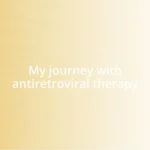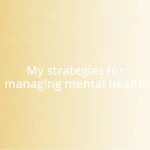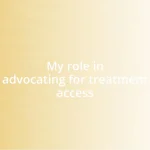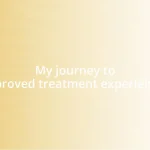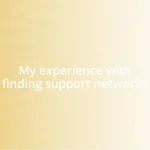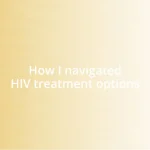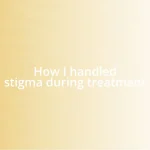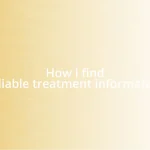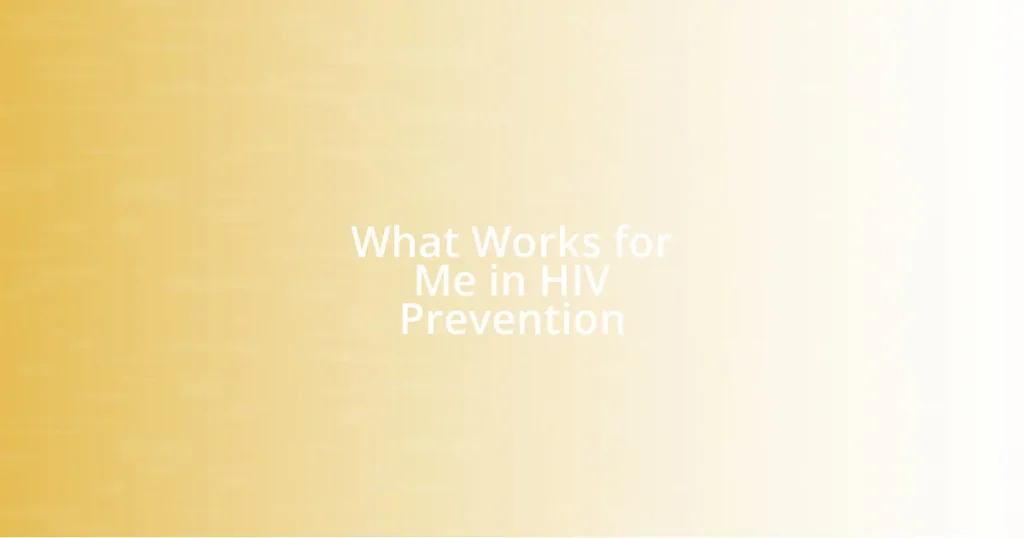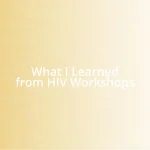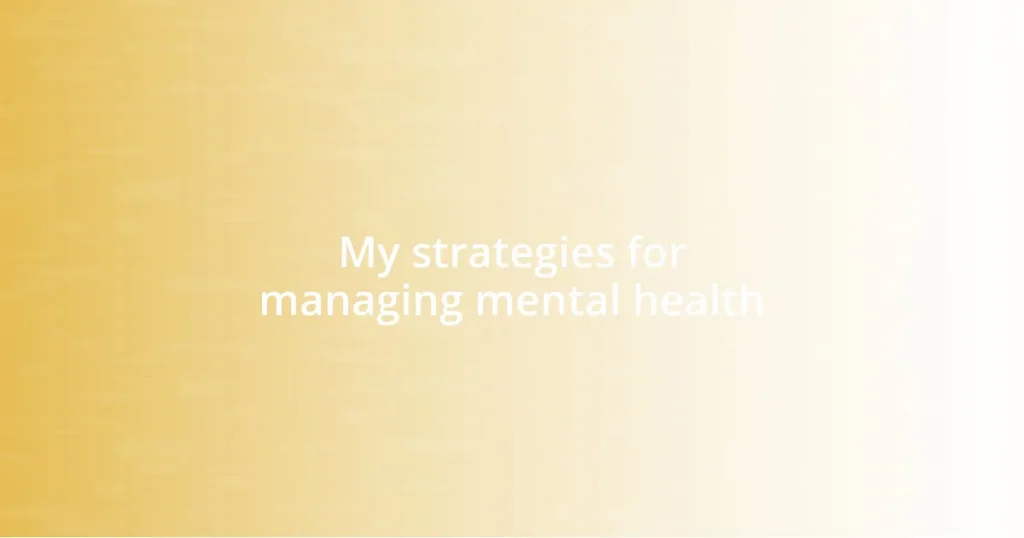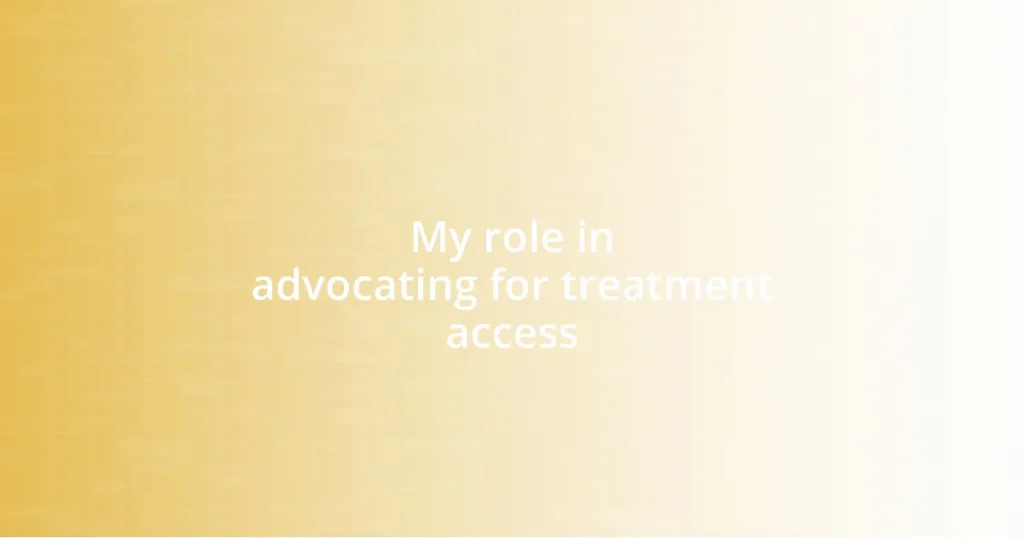Key takeaways:
- Maintaining a strong support network is crucial for sharing experiences and empowering informed decisions about HIV prevention.
- Pre-exposure prophylaxis (PrEP) significantly reduces the risk of HIV when taken consistently, fostering open discussions in relationships.
- Regular testing promotes personal awareness and reduces stigma, leading to healthier choices and community support.
- Evaluating personal risk factors, including substance use and mental health, is essential for making informed decisions related to sexual safety.
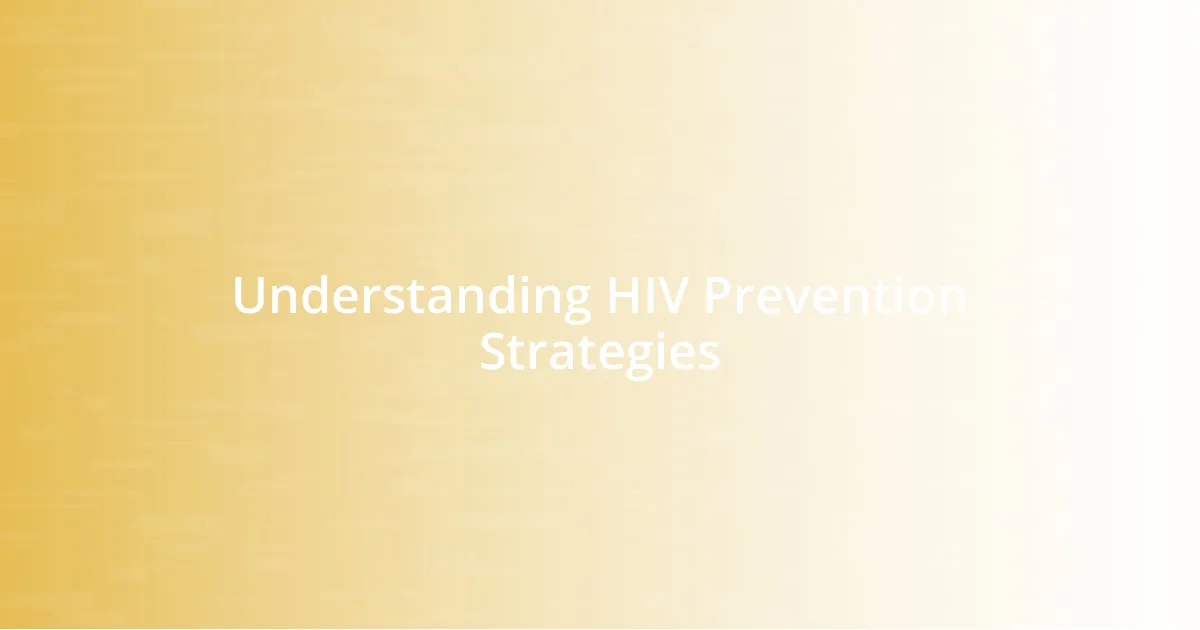
Understanding HIV Prevention Strategies
One HIV prevention strategy that stands out to me is maintaining a strong support network. I recall a time when a close friend confided in me about their fears related to HIV. It was through our conversations that I realized the power of sharing experiences and knowledge; it brought us closer and helped us both understand risk factors better. Isn’t it comforting to know that sometimes, just talking about these concerns can empower individuals to make more informed decisions?
Another effective approach is the use of pre-exposure prophylaxis (PrEP). I remember being skeptical about it at first, thinking, “Is this truly safe?” After doing my research and speaking with healthcare professionals, I learned how it works and the significant protection it offers. It’s amazing how empowering knowledge can be; when I finally understood PrEP, it felt like someone had lifted a heavy weight from my shoulders.
Finally, regular testing is essential for effective HIV prevention. I’ll never forget the anxiety I felt before my first test. However, once I overcame that initial fear and made testing a routine part of my health care, it transformed my perspective. How many people feel the way I did, thinking that ignorance was a safer route? Regular testing not only enhances personal awareness but also contributes to the overall community health, fostering a culture of openness and education. It’s a simple action that can make a profound difference.
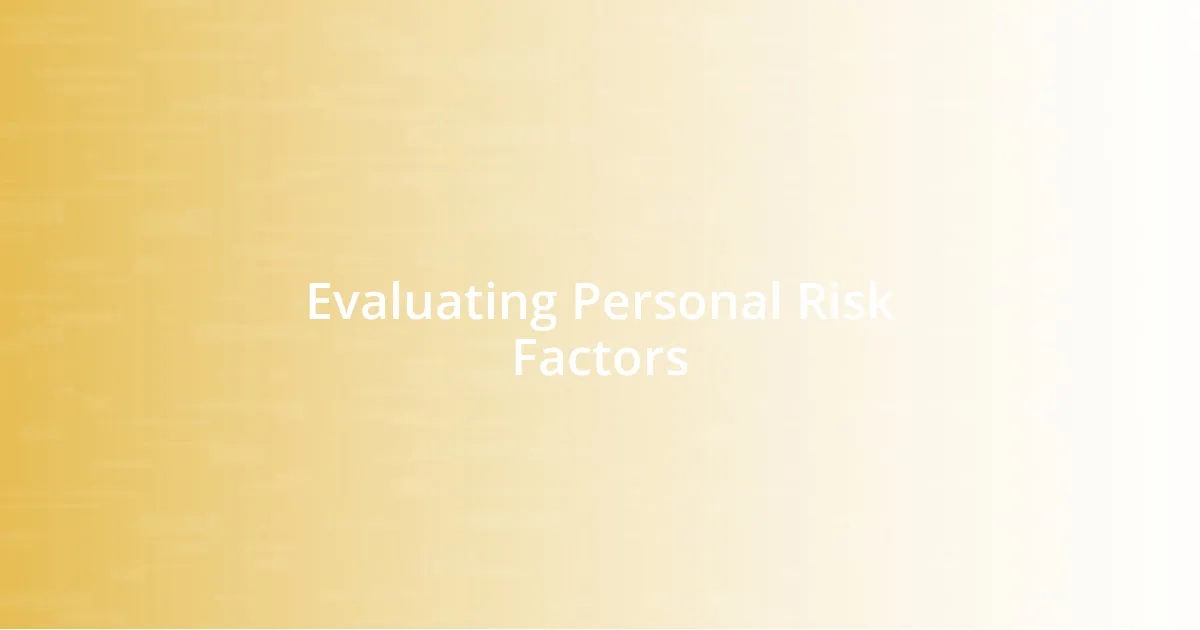
Evaluating Personal Risk Factors
When I reflect on evaluating personal risk factors for HIV, I realize it’s crucial to start with an honest self-assessment. For instance, I once had to confront my own habits around substance use. During that time, I considered how certain behaviors might increase my susceptibility. I found that acknowledging those risks was the first step towards making healthier decisions. Have you ever had a moment of clarity where reality hit you? It can be the spark that ignites a meaningful change.
Another important aspect of personal risk evaluation is understanding one’s sexual history. I remember having a candid discussion with my partner about our past experiences. This conversation not only made us both feel more connected but also helped us recognize what we needed to address together moving forward. It’s amazing how sharing those stories can clarify potential risks and ensure both partners are on the same page.
Lastly, I think about how mental health plays a role in risk evaluation. There was a time when I was feeling down, and I noticed my ability to make wise choices around my health was compromised. When you’re struggling with stress or anxiety, it’s easy to overlook essential self-care practices. This realization made me prioritize mental well-being as part of my overall health strategy. It’s vital to check in with ourselves and acknowledge how our emotional state can influence our decisions.
| Risk Factor | Personal Reflection |
|---|---|
| Substance Use | Acknowledging my habits allowed me to make healthier choices. |
| Sexual History | Open discussions with partners create awareness and foster trust. |
| Mental Health | Your emotional state can greatly affect your decision-making around health. |
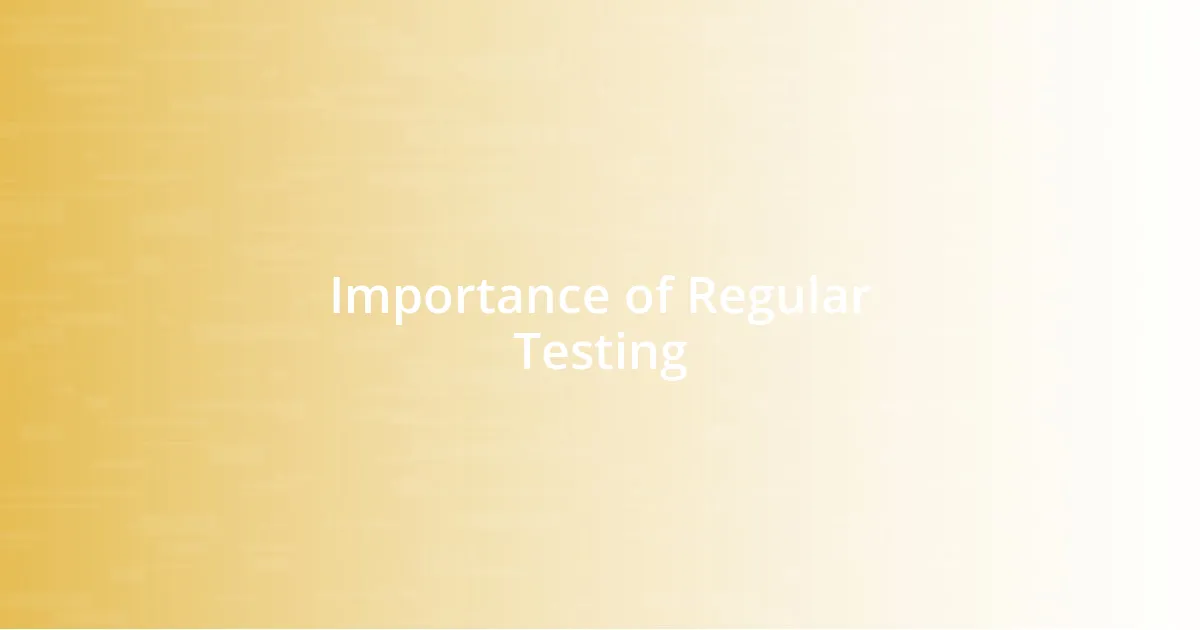
Importance of Regular Testing
Regular testing is a cornerstone of HIV prevention, and I can’t stress enough how empowering it can be. The first time I stepped into a clinic for testing, my heart raced with uncertainty. However, I soon realized that those butterflies in my stomach were a small price to pay for the peace of mind that regular testing provides. Knowing my status allowed me to take control of my health and make informed choices. It’s not just about me; it’s a step towards supporting my community as well.
- Regular testing reduces the stigma surrounding HIV, promoting a culture of openness.
- It allows for early detection and treatment, which can lead to better health outcomes.
- Regularly knowing your status empowers you to educate others and share experiences.
- It provides the opportunity for discussions with partners about health and safety.
I remember discussing my test results with a close friend who had previously avoided testing due to fear. When I shared how my experience helped alleviate my anxiety, it encouraged them to take that step too. Seeing them feel relief after their first test was incredibly rewarding. I’ve found that regular testing can create a ripple effect, fostering a supportive environment where everyone feels more comfortable discussing HIV. This openness can ultimately lead to healthier choices and empowered communities.
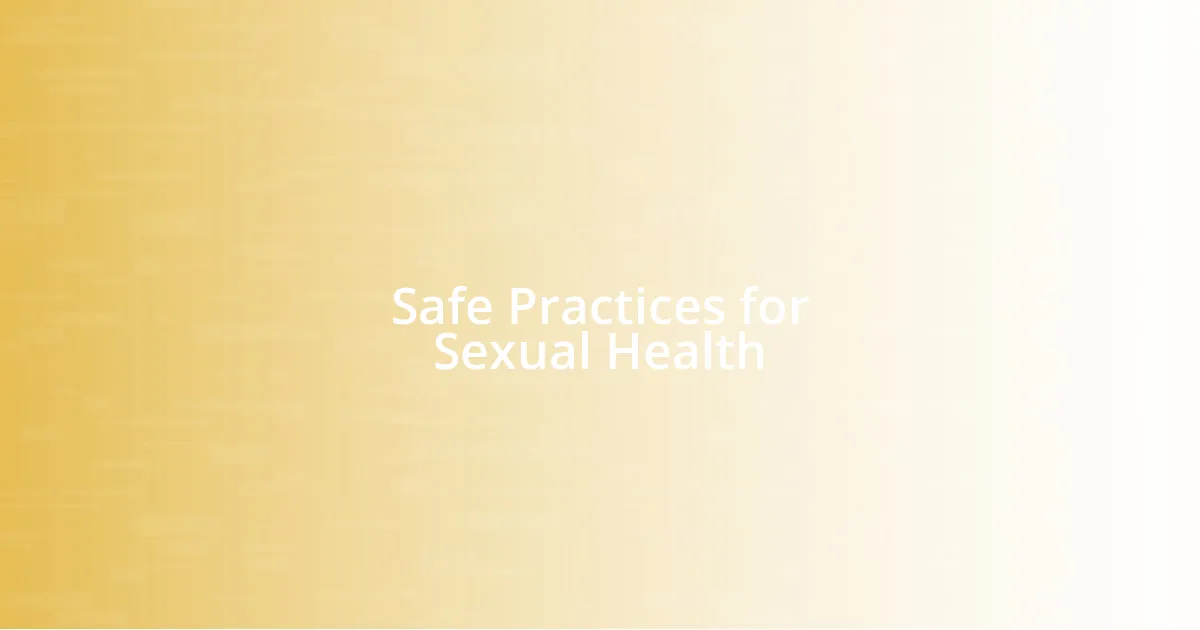
Safe Practices for Sexual Health
Engaging in safe practices during sexual encounters is something I truly believe can make a difference. I remember a time when I hesitated to bring up condom use with a partner. It felt uncomfortable, yet that conversation turned out to be crucial. Once we discussed it openly, we felt a lot more at ease and ready to explore our intimacy without the cloud of worry. Are we really protecting not just ourselves but each other? That dialogue is essential, and it can pave the way for a healthier relationship.
Additionally, I’ve learned that being aware of the various options for prevention is fundamental. When a friend introduced me to PrEP, it was like a lightbulb moment. I had heard about it but didn’t fully understand how it worked until they explained it. Knowing that there are effective preventive measures out there empowered me to consider them in my sexual health strategy. It’s not just about one method; it’s about creating a multi-layered approach to protection. Feeling informed is half the battle, don’t you think?
Lastly, I can’t downplay the importance of emotional connection when it comes to safe practices. In my experience, when I feel emotionally secure with my partner, it’s easier to focus on safety. I recall a moment when I was deeply in love, and we both prioritized regular check-ins about our health. This habit fostered a sense of trust that enhanced our intimacy. I often wonder, how does our emotional state influence our commitment to safety? I firmly believe that nurturing a strong emotional bond can naturally lead to safer behaviors.
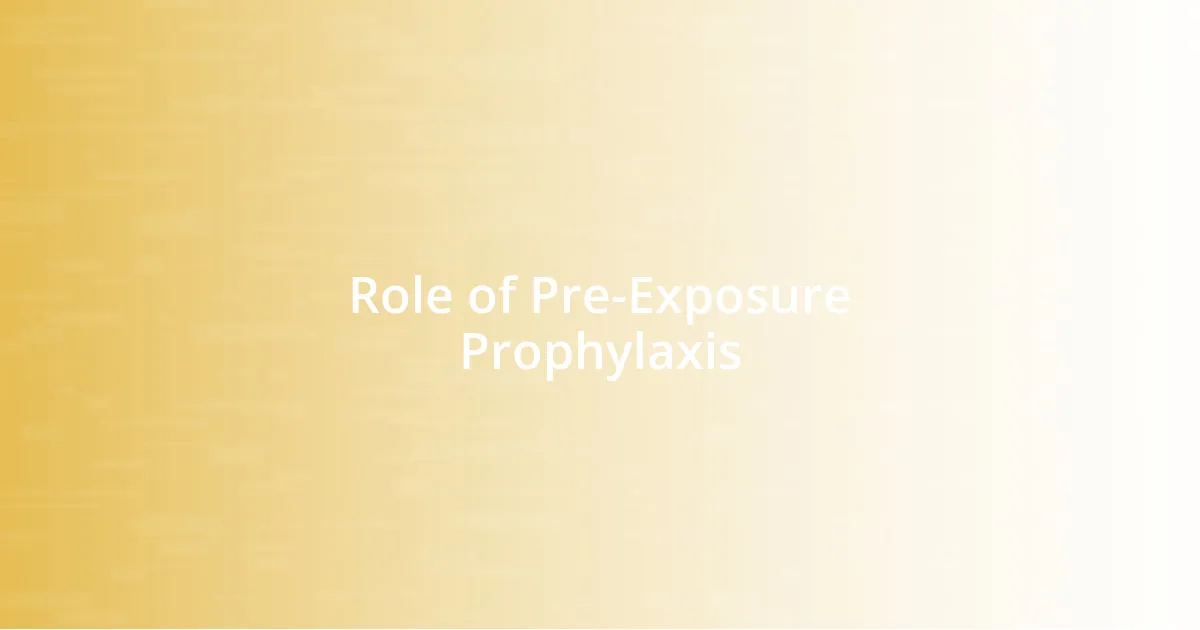
Role of Pre-Exposure Prophylaxis
The role of Pre-Exposure Prophylaxis (PrEP) in HIV prevention cannot be overstated. I vividly recall the first time I learned about PrEP during a health workshop. At first glance, I was intrigued by the science behind it—a daily pill that could help prevent HIV if taken consistently. The idea that I could take an active role in my protection felt empowering and inspired me to dig deeper into how it works.
What really resonated with me was the sense of security PrEP provided in my relationships. One evening, while discussing our plans for the future with my partner, I brought up the topic of PrEP. Their enthusiastic response reaffirmed our mutual commitment to health and safety. Don’t you think discussing preventative measures strengthens the bond between partners? I’ve found that when both parties are informed and engaged, it fosters openness and trust, making navigating sexual health a shared journey.
Additionally, I’ve seen firsthand how PrEP can help dissolve the fear that often accompanies sexual encounters. A friend of mine decided to start PrEP after feeling anxious about potential exposure risks. As they shared their experience, my admiration grew; the simple act of taking charge of one’s health can truly transform the way we approach intimacy. How liberating is it to know that there is a preventive option available that can significantly reduce our risk? Embracing PrEP not only shields individuals but opens the door to healthier conversations and relationships—something I find invaluable in the journey of HIV prevention.
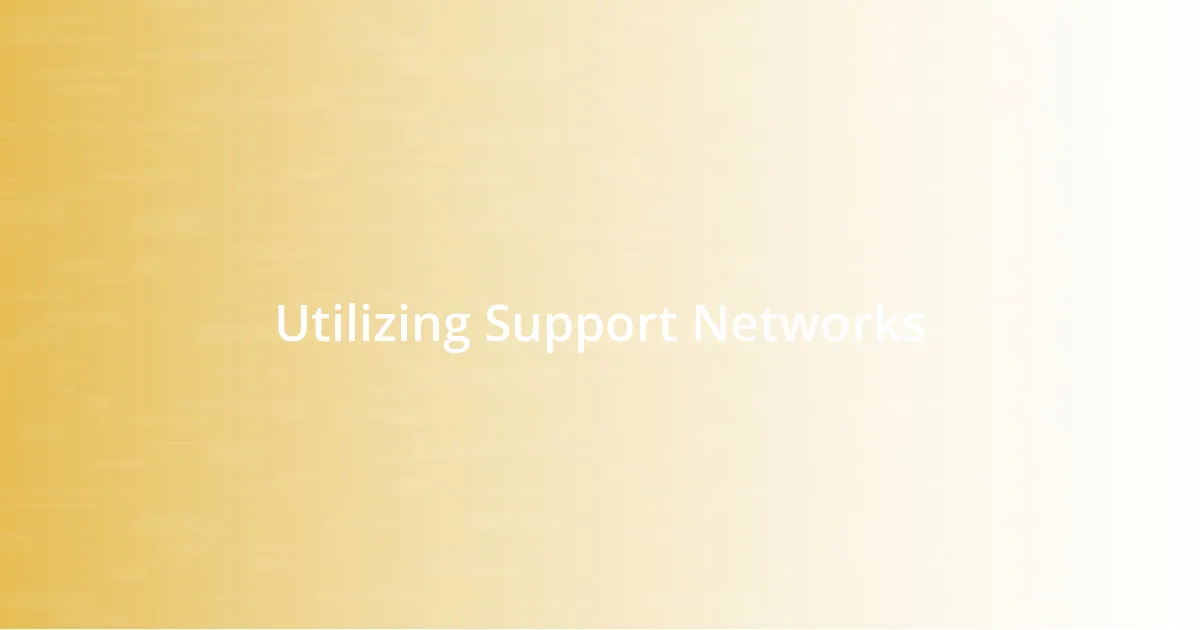
Utilizing Support Networks
Utilizing support networks can be a game-changer in HIV prevention. I can recall a time when I was feeling overwhelmed with my sexual health decisions, only to find solace in a local support group. Sharing my concerns and hearing others’ stories reinforced the idea that I wasn’t alone in this journey. Isn’t it comforting to know there are others who understand your struggles?
The uplifting atmosphere in these gatherings has consistently encouraged me to make informed choices. One person shared how their relationship with their family provided a safety net—they could discuss health topics freely without the fear of judgment. This inspired me to have a heart-to-heart with my own loved ones about my health. Have you ever considered how a conversation with a trusted friend might reshape your perspective on such topics? Opening up to others can create a sense of community that lifts us in those moments of uncertainty.
Importantly, I believe the emotional support aspect is invaluable. There were days when I felt hesitant or anxious about getting tested, and having friends who reminded me of the significance of regular health checks made a world of difference. Their encouragement acted as a gentle nudge toward prioritizing my well-being. In those instances, I realized that a solid support network doesn’t just provide practical advice; it boosts our confidence and commitment to staying healthy. How much could our well-being improve if we leaned into those around us for support?
